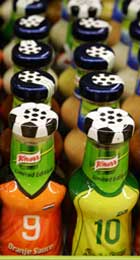|
|
| Ketchup for Cup |
ALL MARKETERS ARE LIARS: The Power of Telling Authentic Stories in a Low-trust World
By Seth Godin,
Michael Joseph, ? 9.10
About twenty years ago, as Seth Godin walked into a tiny and obscure drugstore in Manhattan called Kiehl?s Since 1851, he was struck by a Ducati motorcycle and a small stunt aeroplane among other surprises. What was Kiehl?s message to the potential customer? Answer: ?this is the work of a person, a unique individual, not a corporation?.
Like Godin, many other customers had bought this story. Today, Kiehl?s has dedicated shops around the globe making millions of dollars annually. If you were one such customer, would you be shocked to know that the company has been owned by the cosmetics giant, L?Or?al, for ages? But the brand did begin as the handiwork of an ?idiosyncratic individual? who was lucky to have his story gel with the ?worldview? of local shoppers. Godin explains: ?it wasn?t Kiehl doing the marketing ? it was his customers. Kiehl?s told a story, and the customers told the lie to themselves and to their friends.?
Seth Godin has been writing marketing bestsellers for a while now. All Marketers are Liars does not claim to be the last word on a subject very difficult to keep up with, but it does tempt the reader with secrets supposedly in the offing. Writing a self-proclaimed book about telling good stories and telling them well, Godin does well to tell a story himself and tell it well. He is lucid and his book jargon-free. A reader, apprehensive of the prospect of dry statistics and lessons in deceiving others for a living, may race through the volume. The book is divided into fourteen chapters, each broken up, in turn, into taut little units that help the author sing and sermonize.
?I have no intention of tell-ing you the truth?, begins Godin. And then adds, ?Instead I?m going to tell you a story.? It is a story meant to demonstrate to marketers why it does not pay to ?communicate facts? but does to study people?s worldviews and then tell them stories that enrich those worldviews.Appropriately, Godin turns the title of the book on its head and says, ?Marketers aren?t liars. They are just storytellers. It?s the consumers who are liars.? If successful marketers just provide stories that consumers have already chosen or will choose to believe, the focus should automatically shift to the latter?s psychology of satisfaction.
Godin deserves credit for re-defining the idea of truth without metaphysical speculations on the subjectivity of things although that is precisely the secret behind consumption. A fundamental mistake the salesman must not make is to na?vely assume that another?s worldview is there for him to change. Instead, the clever marketer identifies a neglected want ? not need ? and frames a story accordingly. Godin?s advice is to live the story one tells ? only then is the story ?authentic?. Selling must begin with oneself in an age when the idea matters more than the making of stuff.
Godin?s weakness lies in that his intellectual backdrop of social psychology and communication theory cannot help but appear somewhat shallow. In the last analysis, all books of popular or professional wisdom generalize, and the reader finds, to his dismay, that the received wisdom goes bust in the selfsame marketplace. Godin takes you only so far. There is something about him that reminds one of Arthur Miller?s Uncle Ben ? showing what success is but never really how to get there.












